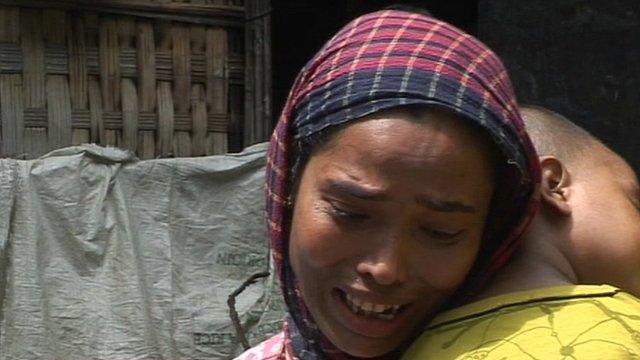'Ten deaths' on stranded Myanmar migrant boat
- Published
The BBC's Jonathan Head found the boat off Thailand (Thursday 14 May): "This is just the most extraordinary scene"
Myanmar migrants on a boat stranded for a week in the Andaman Sea with no food or water say 10 people have died, while some are resorting to drinking urine.
The fishing boat, carrying about 350 people of the Muslim Rohingya minority, has been refused entry to Thailand.
Those on board told the BBC the crew abandoned them and disabled the engine. They said the bodies of those who had died were thrown overboard.
Indonesia, Malaysia and Thailand have been turning away migrant boats.
'Desperate sight'
Several thousand people are still believed to be stuck in boats off the coasts of Thailand and Malaysia.

Few Rohingyas have in recent days made it to the shore
Most are Rohingya Muslims who cannot go back to Myanmar, also known as Burma, where they are not recognised as citizens of the country and are regularly persecuted.
Some of those who are adrift in the Andaman Sea have been provided with food, water and medicine by the Thai navy.
It is not clear how many other boats are in a similar predicament.
Some boats containing migrants have been towed over to the Malaysian side of the border - where most migrants want to go - only to be taken back into Thai waters.
No-one wants them, the BBC's Jonathan Head says, and seeing them off the southern coast of Thailand, near Koh Lipe, that it is a "desperate sight" as they beg for food and water.
On one crowded vessel with a lot of women and children on board, our correspondent saw people drinking their own urine from bottles.
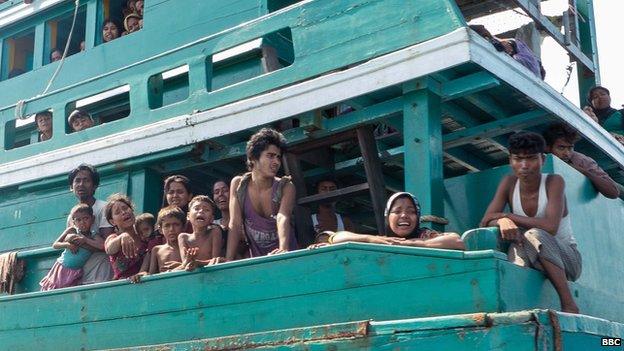
The passengers were abandoned by their crew six days ago

The desperate cries of the migrants can be heard resounding across the sea

Thai fishing boats found the migrant boat off the southern coast of Thailand
The migrants - including 50 women and 84 children - said they had been at sea for three months.
Their situation became critical when their crew abandoned them without a working engine six days ago anchored near the Thai-Malaysian border.

Phil Robertson, deputy director of Human Rights Watch's Asia division told the BBC: "They're [Malaysia, Thailand and Indonesia] playing a game of marine ping-pong not wanting to take in the Rohingyas.
He said it was necessary for the three countries to work together in rescuing them before they decide who is going to take responsibility for them.
"This is an urgent humanitarian crisis and the Thais and others seem to be taking a gentle stroll."


The migrants have been held in punishing conditions
Who are the Rohingyas?
Rohingyas are a distinct, Muslim ethnic group mainly living in Myanmar, which is also known as Burma
Thought to be descended from Muslim traders who settled there more than 1,000 years ago
Also live in Bangladesh, Saudi Arabia and Pakistan
In Myanmar, they are regularly persecuted - subjected to forced labour, have no land rights, and are heavily restricted
In Bangladesh many are also desperately poor, with no documents or job prospects

As many as 8,000 migrants from Bangladesh and Myanmar are believed by the International Organisation for Migration (IOM) to be stranded at sea.
People smugglers are reportedly refusing to land their boats because their usual route through Thailand has been disrupted by a government crackdown. It was launched after the discovery of dozens of bodies in abandoned camps along the land route.
A senior Thai official reiterated on Wednesday that Thailand, Malaysia and Indonesia would all continue to turn the boats away.
On Sunday and Monday more than 2,000 migrants arrived in Malaysia or Indonesia after being rescued or swimming ashore.
The journey the migrants take - from Bangladesh or Myanmar through the Bay of Bengal to Thailand or beyond - takes several weeks and has been made by Rohingyas for much of the last 10-15 years.
Their journeys have in some cases been further disrupted because they have in effect been held hostage by the people smugglers.
- Published18 May 2015
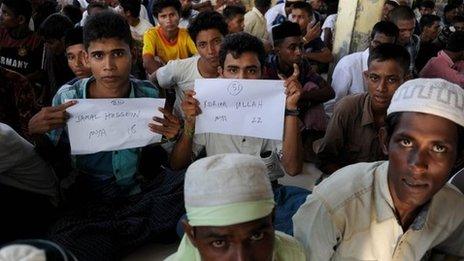
- Published14 May 2015
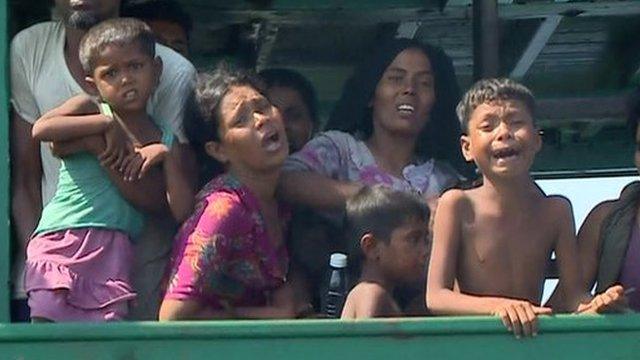
- Published13 May 2015
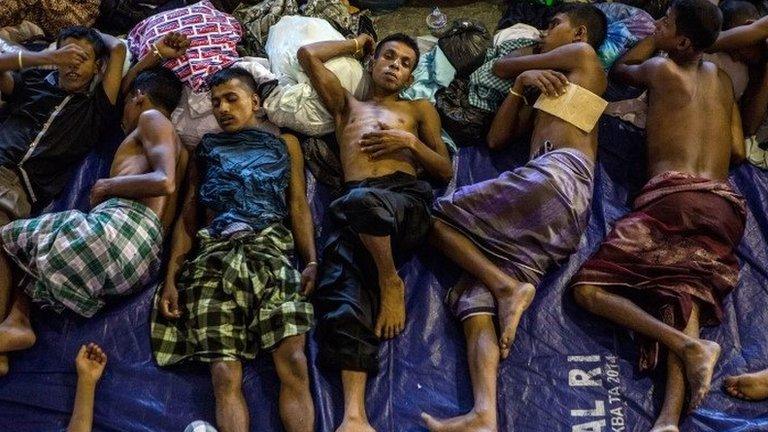
- Published25 November 2012
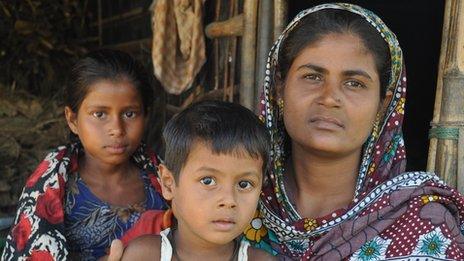
- Published23 July 2012
